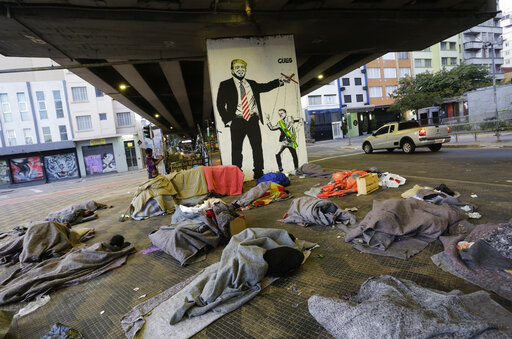While humanity has made great strides in narrowing the gap in basic living standards for millions of people, other aspects of inequality have triggered protests and demonstrations around the world. A new United Nations Human Development Report shows new battlegrounds for inequality, including education, technology, and climate change.
United Nations Development Programme (UNDP) official, Achim Steiner, is calling for a new way to measure inequality. “What was once sufficient, namely to measure per capita income, is simply no longer adequate in capturing inequality in the 21st century.”
The report argues that income is no longer the most important factor in measuring inequality.

A boy walks past a bus station damaged by anti-government demonstrators, in Bogota, Colombia, Friday, Nov. 22, 2019. Protesters attacked the station Thursday during a nationwide strike called by labor unions, students and teachers to protest everything from economic inequality to violence against social leaders.
A boy walks past a bus station damaged by anti-government demonstrators, in Bogota, Colombia, Friday, Nov. 22, 2019. Protesters attacked the station Thursday during a nationwide strike called by labor unions, students and teachers to protest everything from economic inequality to violence against social leaders.
“The capabilities approach, the kind of education opportunities we have, the families we are born into, all this begins to define a life’s journey,” Steiner said.
The study found that inequality starts at birth, with the social class children are born into. According to the study: “Children in professional families in the United States are exposed to three times as many words as children in families receiving welfare benefits, with a knock-on effect on test scores later in life.”
The report also says that the gender gap in pay could take more than 200 years to close, based on current trends. Data from 2019 indicates progress is actually slowing.
Access to technology is also becoming increasingly important, the report said.

Homeless people sleep under a bridge in front of a mural depicting U.S. President Donald Trump as a puppeteer manipulating Brazil's President Jair Bolsonaro, in downtown Sao Paulo, Brazil, Tuesday, July 23, 2019. Bolsonaro said last week that severe hunger is not a problem for the country. He acknowledged that things could "go bad" and people might "not eat well." But, he added: "To speak of starving in Brazil is a big lie."
Homeless people sleep under a bridge in front of a mural depicting U.S. President Donald Trump as a puppeteer manipulating Brazil's President Jair Bolsonaro, in downtown Sao Paulo, Brazil, Tuesday, July 23, 2019. Bolsonaro said last week that severe hunger is not a problem for the country. He acknowledged that things could "go bad" and people might "not eat well." But, he added: "To speak of starving in Brazil is a big lie."
“What used to be ‘nice-to-haves’, like going to university or access to broadband, are increasingly important for success, but left only with the basics, people find the rungs knocked out of their ladder to the future,” argues UNDP’s Pedro Conceicao.
Many countries have been battling income inequality, with varying degrees of success. China aims to eradicate poverty by 2020.
"We must ensure that by the year 2020, all rural residents living below the current poverty line have been lifted out of poverty, and poverty is eliminated from all poor counties and regions," Chinese President Xi Jinping said in a report delivered to the 19th National Congress of the Communist Party of China (CPC).
As ambitious as this goal sounds, past performance indicates it is attainable. Since initiating market reforms in 1978, the World Bank says over 850 million Chinese have lifted themselves out of extreme poverty.